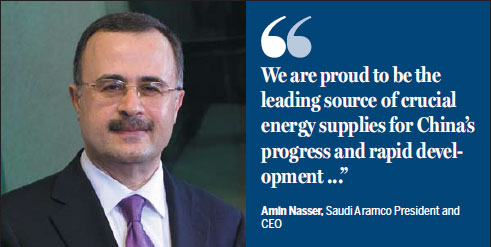Helping China build a prosperous future
(China Daily) Updated: 2016-01-20 08:16
|
Amin Nasser says China's Belt and Road Initiative offers tremendous opportunities in the coming years. |
Editor's note: With energy supply and the Belt and Road Initiative high on the agenda for President Xi Jinping's state visit to Saudi Arabia, China Daily spoke with Saudi Aramco, a leading supplier of crude oil to China, about its current cooperation with Chinese companies and plans for the future.
Saudi Aramco President and CEO Amin Nasser said that the relationship between Saudi Arabia and China is historical, deep and growing, and China's Belt and Road Initiative will offer tremendous opportunities in the coming years.
"We are proud to be the leading source of crucial energy supplies for China's progress and rapid development, and we are increasingly looking to China as a major source for our engineering and procurement. The Chinese market also offers attractive and mutually beneficial downstream energy growth opportunities. We are especially pleased that what started as a producer-consumer relationship continues to grow from strength to strength, with greater strategic cooperation toward shared goals and joint collaboration in R&D and innovation, and human resource development in leading Chinese universities. A prime example of our collaborative partnership is Yanbu Aramco Sinopec Refining Co, our award-winning joint venture with Sinopec, which is a world-class refinery that can meet the most stringent global fuel specifications."
More than 3 billion barrels of oil, equivalent to 42 million metric tons, have been delivered since the first shipload of Arabian crude reached Sinochem in 1991 via the Maritime Silk Road. In 2015, Saudi Aramco was China's largest source of crude oil, with the trade volume standing at 1 million barrels per day, an increase of 2 percent on the previous year, and accounting for more than 15 percent of total Chinese imports.
To integrate regional operations and better fit into the dynamic Asian market, in 2012 Saudi Aramco moved the headquarters of its fully-owned Asian subsidiary to Beijing. Over the years, Saudi Aramco has strengthened its relationships with China's top energy companies, including Sinopec, CNPC, CNOOC and Sinochem. In April 2015, Wanhua Chemical Group, China's largest propane dehydrogenation plant, was added to the liquefied petroleum gas customer list; and Aramco is now pursuing Southwest China cooperation with CNPC, which is an integrated refinery and marketing project.
The trade between Saudi Arabia and China is two-way and mutually beneficial. For some 2,000 years, trade and commerce have linked the Arabian Peninsula and China. Trade has flowed both ways, and involved not only silk, spices, ceramics and textiles, but also ideas and innovations, elements of culture and learning, and religious and philosophic teachings. The trade and cultural exchanges in olden days were conducted overland along the great Silk Roads as well as through important maritime links.
Today, Chinese companies have a significant presence in Saudi Arabia, and enjoy unprecedented investment opportunities. So far there are 160 Chinese companies operating in Saudi Arabia in sectors such as construction, infrastructure, telecommunications and petrochemicals, among others. In energy, for example, Sinopec International Petroleum Services is active in the areas of upstream drilling and seismology.
Many more Chinese companies are welcome to explore Saudi Arabia's huge potential opportunities, including the three newly developed industrial cities of Jazan, Al-Hasa and Ras Al-Khair.





